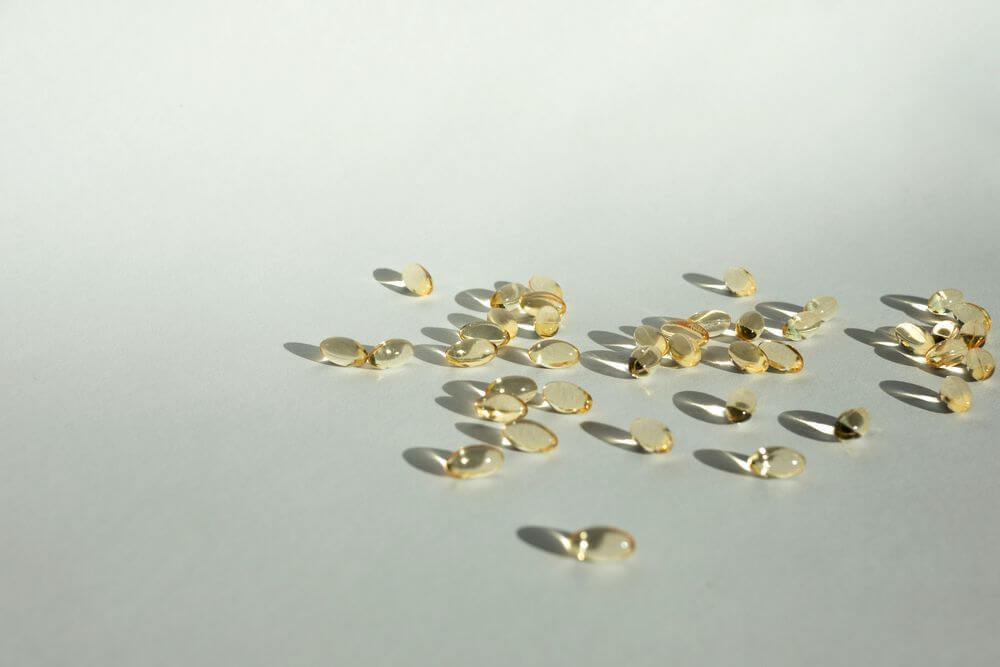Vitamin D3 and K2 Benefits: Explained
Curious about the health benefits of Vitamin D3 and K2? Learn how these two vitamins synergize for optimal wellness. Learn more!

Vitamin D3 and K2 Benefits: Explained
In today’s digital landscape, we’re oversaturated with countless think pieces about vitamins and minerals that deserve our attention. This overwhelming abundance of information can make it challenging to know where to begin. So, let’s cut through the noise and focus on one of the most essential vitamins for our health: Vitamin D3 & K2. Together, we’ll uncover why these vitamins are a vital component of our well-being and longevity.
Understanding Vitamin D3: The Essential Sunshine Vitamin
Vitamin D3, or cholecalciferol, is a fat-soluble vitamin that plays a vital role in various bodily functions, including maintaining bone strength and supporting cardiovascular health. In fact, vitamin D3’s anti-ageing benefits have been heavily explored in research. One study involving 21,148 participants found that vitamin D supplementation notably reduced inflammatory markers like TNF-α and CRP, as well as the oxidative stress marker malondialdehyde.
Often referred to as the "sunshine vitamin," Vitamin D3 is produced in the skin when exposed to sunlight. In addition to sun exposure, you can also obtain Vitamin D3 through your diet by consuming foods such as fish, eggs, and cheese.
Vitamin K2: The Underrecognized Nutrient
While Vitamin D3 often steals the spotlight, its lesser-known counterpart, the benefits of vitamin K2, are equally crucial for maintaining strong bones and a healthy heart. This fat-soluble vitamin is often overlooked in dietary discussions, but can easily be sourced from various foods such as meat, airy products such as cheese, yogurts, eggs and fermented products.
Unlike Vitamin K1, which primarily aids in blood clotting, K2 is vital for calcium metabolism. Vitamin K2 is responsible for activating proteins that regulate calcium metabolism, ensuring this essential mineral strengthens our bones and teeth instead of accumulating in our arteries and soft tissues. This vital action helps reduce the risk of cardiovascular disease and arterial calcification, as well as reducing the risk of osteoporosis and fractures.
How do Vitamin D3 and K2 Work Together?
In recent years, interest in the combination of vitamins D3 and K2 has surged, thanks to their synergistic health benefits. This dynamic duo has garnered attention from health enthusiasts and researchers alike for their ability to work together to optimize calcium utilization in the body.
Key Health Benefits of Vitamin D3 and K2
Supports Bone Health and Cardiovascular Health
Vitamins D3 and K2 form a powerful partnership in calcium management, working synergistically to optimize its utilization in the body. Vitamin D3 enhances calcium absorption from the intestines, while Vitamin K2 directs this calcium to bones and teeth, promoting strong bone mineralization and dental health. This dynamic duo helps prevent long-term issues like osteoporosis by ensuring calcium is effectively utilized where the body needs it most.
Importantly, Vitamin K2 plays a crucial role in preventing arterial calcification by guiding calcium away from blood vessels and towards bones and teeth. This action potentially reduces the risk of heart disease. Without adequate K2, calcium may accumulate in arteries and soft tissues, compromising cardiovascular health.
This partnership not only promotes bone health but also supports cardiovascular well-being by preventing calcium misplacement. Think of this vitamin duo as a precise delivery system, guiding calcium to where it's needed most - your skeletal structure - while preventing its accumulation in undesirable locations like your arteries.
Supports Anti-aging by Combatting Inflammation
Vitamins D3 and K2 join forces to bolster the immune system and regulate inflammation. Research reveals that calcitriol, the active form of vitamin D, performs crucial immunomodulatory functions. These include suppressing pro-inflammatory cytokines and regulating immune cell activity. One study even found that vitamin D supplementation reduced proinflammatory cytokines in patients with osteoporosis and heart failure.
Vitamin K2 complements these effects with its own anti-inflammatory properties. It suppresses inflammatory mediators and inhibits NF-κB activation, a key regulator of inflammatory pathways. Their combined anti-inflammatory properties may contribute to a more balanced immune response, helping to prevent chronic inflammation that underlies many age-related diseases.
Ways to Incorporate Vitamin D3 and K2 into Your Life
In an era of widespread nutrient deficiencies, incorporating vitamin D3 and K2 into your daily routine can significantly improve your health. Here are three effective strategies:
Sun Exposure
Spend 15-30 minutes in the sun daily, allowing your skin to produce vitamin D3 naturally. The best time for sun exposure is midday when UVB rays are strongest. Expose larger areas of skin like arms and legs for optimal vitamin D production. However, be mindful of sunburn risk and apply sunscreen before going on extended walks.

Diet
Consume foods rich in vitamin D3 and vitamin K2 into your diet. For vitamin D3, include salmon, mackerel, and tuna in your diet. Egg yolks and fortified dairy products are also good sources. For K2, focus on consuming fermented foods like natto, sauerkraut, and certain aged cheeses like Gouda.

Supplementation
Consider taking a combined D3 and K2 supplement, especially if you have limited sun exposure during the winter periods or a restricted diet. Look for supplements that contain both vitamins in appropriate ratios. Typical dosages range from 1000-5000 IU of vitamin D3 and 100-200 mcg of vitamin K2 (MK-7 form) daily. Always remember to consult your healthcare provider before starting any new supplement regimen, particularly if you have existing health conditions or are taking medications.
Exploring Potential Risks and Side Effects
Vitamins D3 and K2 are generally safe, but caution is necessary. Excessive vitamin D3 intake can cause hypercalcemia - excessive calcium in the blood. This can lead to symptoms like loss of appetite, excessive thirst, kidney stones, nausea, and vomiting. Vitamin K2, however, has a low toxicity risk. Regardless, always consult a healthcare provider before starting any supplements, particularly if you're on medication.
Take Control Of Your Health With A GlycanAge Test
GlycanAge is an innovative biological age test that measures aging at the molecular level by assessing chronic inflammation. This test evaluates how your lifestyle choices impact your biological age, offering a unique glimpse into your cellular health.
After testing, you receive a comprehensive report detailing your biological age and a breakdown of your glycan profile results into specific indexes. A GlycanAge specialist then guides you through these insights, explaining how they relate to various aspects of your health and suggesting proactive measures to optimize your lifestyle and potentially reduce your biological age.
This approach empowers you to take action and monitor your progress using an objective metric, keeping you motivated on your journey towards longevity. GlycanAge offers flexible pricing options to suit different needs. Begin your path to better health today with a quick and simple health quiz.
Frequently Asked Questions (FAQs)
How much vitamin D3 and K2 should I take daily?
Many other countries around the world and some professional societies have somewhat different guidelines for recommended vitamin D intakes. If you are worried about not gaining enough vitamin D3 & K2 through your diet, the best practice is to consult with a healthcare provider about doing a blood test. This will help you to assess potential deficiencies in vitamin D3 and K2 before supplementing further.
Recommended daily intakes for vitamin D3 and K2 can vary. While 600 IU of vitamin D3 is often suggested, along with 75 mcg of vitamin K2. Guidelines differ across countries and professional societies. Individual needs may vary significantly based on factors like diet, sun exposure, and health conditions.
If you're concerned about your vitamin D3 and K2 levels, the best approach is to consult a healthcare provider. They can recommend appropriate blood tests to assess potential deficiencies before suggesting any supplementation. This personalized approach ensures you receive the right amount of these vital nutrients for your specific needs.
When is the best time to take vitamin D3 and K2?
Vitamins K2 and D3 are fat-soluble, meaning they are best absorbed with meals that contain dietary fat. You can take them at any time of day, but it's advisable to consume them with a source of fat.
Some individuals find that taking vitamin D3 late in the day may interfere with sleep, so it's often recommended to take it earlier. A practical approach is to take both vitamins together with breakfast or lunch, which usually includes some fat for better absorption.
Consistency is essential when taking vitamins; the most important factor is to take them regularly rather than at a specific time of day.
Who should not take vitamin D3 and K2?
Individuals taking certain medications, such as anticoagulants and antibiotics should consult their healthcare provider before taking vitamin K2, as it may interfere with the medication's effectiveness or lead to certain interactions. Patients with health issues should also seek medical advice before starting vitamin D3 or K2 supplements. Always consult a healthcare professional before beginning any new supplement regimen.
Can I give vitamin D3 + K2 supplement to my child?
It's best to ensure that children are getting these vitamins through their diet before considering supplements. However, if supplementation is necessary, always consult with a healthcare provider first to determine the appropriate dosage and ensure it aligns with your child's specific health needs.


